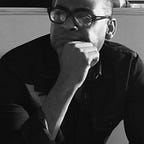“So… What was Kamala Really Like?”
The Weirdness of Trying to Explain Howard University and Black Excellence to an Often Clueless Press
By Eric Easter
At least half a dozen times since January of this year, I’ve fielded phone calls form major media outlets asking if I would provide some insight into Howard University during the time that Sen. Kamala Harris was a student. That makes me one of a group of several 1980’s Howard friends who frequently get the same queries.
In my case, that’s mostly accidental.
After running into Senator Harris a few times in airports and having a casual strategy chat with one of her staffers, I somehow made it onto an unofficial list of people the campaign refers to media to give political and historical context of her time in college. I always make it clear, however, that historical/political/cultural context is all I’m willing to offer. As someone who went straight from graduation into presidential politics and media, I can likely add a different perspective. But I draw the line there.
Our Howard years did overlap, we are acquaintances, we hung in the same circles, and we are always glad to see one another — on the fairly rare occasions that we do. Yet I am not a close friend, as close friends go. We don’t talk regularly. I can’t tell you what’s on her mind, or what drives the decisions she makes, and I won’t try.
But the Howard connection is strong, which makes her family, and I’m happy to help tell the story of the strong foundation that the double whammy of being at Howard, and in peak Marion Barry Chocolate City, provided.
I do these mostly “on background”, which means I might get quoted, but more often than not the bulk of what I say tends to appear somewhere in the narrative. Or at least that’s the hope, because given the nature of the questions about both Kamala and Howard, the narrative could go easily go awry.
The questions, especially those during the primary season, often reveal an alarming cultural ignorance about the HBCU experience, and an elevated level of distrust in Senator Harris’ “authenticity” — — as a candidate and as a Black woman. Reporters are seemingly mystified that someone with a reputation as a tough prosecutor could also be warm, attractive, funny and multi-talented in the same package — and from a black school no less. Those limiting perceptions made all the more disconcerting by the fact that some of those same reporters have been Black, but who notably attended predominately white universities.
A small sampling of the least offensive queries:
“Is the laugh real?”
“Did Kamala play up the bi-racial thing at Howard to stand out?”
“Do you think she emphasized her Jamaican side to fit in?”
“Do you think she went out of her way to emphasize her intelligence so she could downplay being pretty?”
All answered by some variation of “Are you serious?”
That women like Kamala Harris are the norm not the exception on Black campuses, that students at HBCUs have access to the world’s best and brightest, and that there is a freeing unity in being surrounded by the breadth of the diaspora, is something Howard and other HBCU grads take for granted, but still a revelation to many.
But this not unusual. As a press aide for both of Jesse Jackson’s presidential campaign, I spent half my time not promoting issues or the candidate, but as a cultural interpreter, forced to explain everything from black church habits to food traditions, identify icons well-known in our community but a mystery to others, and give lessons in a more inclusive American history that schools fail to teach. All in an attempt to help reporters — whose sole experiences with Black people were often Soul Train and Motown lyrics — get the story straight.
To the credit of the press, the questions have changed a bit since Harris’s nomination to the Democratic ticket. They’ve had more time to get to know her, so gone is the deep suspicion, replaced by questions that earnestly try to understand Howard’s role in Black political thought and find the ingredients to the secret formula that makes Kamala, and so many other HBCU graduates, successful.
It is indicative of the hill Harris has had to climb to be seen as more than the sum of her ambitions. She and her team smartly used the downtime after the primaries to tell her story more fully. In past weeks, she has deftly used walks through Howard’s campus as the preferred backdrop for interviews, letting people see first-hand what she experienced.
Her uplifting story is a great counterweight to the madness that Trump, COVID and the economy have created. Hopefully it’s that version of her story that will continue to be told when she becomes the first Black and first woman vice president.
